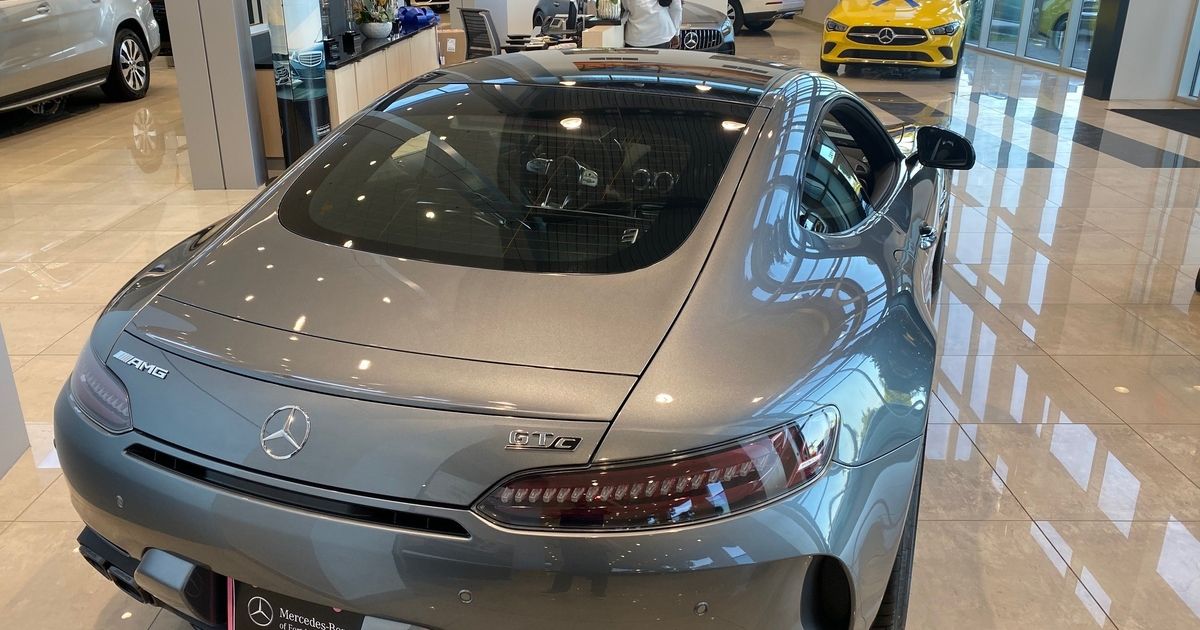
Mercedes-Benz is transforming its product focus — going all-electric and further upmarket. But the luxury brand is also rethinking how it supports its U.S. retail network.
At a national dealer meeting in Dallas on Thursday, Mercedes-Benz USA CEO Dimitris Psillakis revealed plans to restructure dealer operations.
Mercedes will split its 383 U.S. dealers into three groups — Air, Land and Sea — based on throughput. Each group will be assigned Mercedes sales, aftermarket and service teams.
The Air group will include large, publicly-traded dealers who account for 25 percent of the brand’s sales volume. The Land group has regional multi-point retailers that generate about 40 percent of sales. Smaller, single-point stores fall into the Sea group.
Psillakis said the new arrangement better aligns corporate support around dealer needs versus the current “one-size-fits-all” structure, which spreads field operations across three geographic markets.
Publicly traded dealer groups with stores across the country have different business goals and operating structures than single rooftop retailers.
“It’s about right-sizing the [field] support to the structure and needs of each dealer group,” Psillakis told Automotive News ahead of the meeting. “How can we make sure that the dealers receive the information and guidance they need, and how do we do that in the fastest and most efficient way.”
The restructuring of dealer operations is a nod to the consolidation in the auto retail industry.
It allows Mercedes to be more attentive to higher-volume stores, said Erin Kerrigan, managing director of Kerrigan Advisors.
“Volume per dealership is one of the biggest drivers of value,” Kerrigan said. “For OEMs, it is less expensive to have higher-volume dealerships and fewer [stores].”
Mercedes retailers are not happy with the new direction — and they voiced frustration.
One California retailer described the restructuring of field operations as a “tremendous step backward” in dealer relations.
“It’s completely out of touch with the reality of what we do,” the dealer said. “Mercedes-Benz would be well advised to understand the value of people and relationships because it’s the dealers that have the relationships with the clients, not the manufacturer.”
Retailers said they are wary that Mercedes could prioritize high-volume dealer groups over the mom-and-pops.
Under the new structure, Mercedes will manage dealer operations from its headquarters near Atlanta. Some field reps would have to relocate to the Atlanta office or move closer to their assigned dealer group offices.
Smaller dealers are “not going to get much attention if any,” the California retailer said. “The dialogue that goes on between dealers and Mercedes-Benz representatives in-person, I don’t know how that’s going to evolve.”
The reshuffling of field reps could also sever long-standing relationships dealers have established with brand reps.
“There is value to face-to-face relationships and in-store visits — you really can’t connect the dots with just data,” said an East Coast retailer who attended the meeting.
And Mercedes could lose key personnel — and the institutional knowledge they’ve amassed over decades. The more senior field staff might be less inclined to pick up their families and move to Atlanta or elsewhere in the country.
“If they left the company, all that brand knowledge and history would be gone,” said a third dealer. “And, you’re going to be dealing with a bunch of kids sitting in front of a laptop in Atlanta.”
Psillakis waved away the retailer hand-wringing.
“We want to take everyone with us,” he said. “The intention is to use the people we have in functions where they can bring their expertise to better support our dealers and accelerate our transformation.”
Psillakis emphasized there would be no reduction in field staff headcount but declined to say how many employees might need to relocate.
“Who’s going to be sitting in Texas … or Chicago — this is to be defined,” he said.
Psillakis emphasized the restructuring intends to make Mercedes more nimble in addressing dealer needs and concerns.
Toward that end, Mercedes will offer retailers consulting-type services.
A tactical team will help under-performing retailers turn around their business or bring new dealers up to speed. Psillakis described it as an “intensive care unit” that works with dealers for a brief period — six months to a year — to help them “fly high fast.”
A “customer-first” team will focus on “taking care of the customer service we are offering, which affects loyalty,” he said.
Meanwhile, a “data team” will help drive store performance by monitoring and measuring KPI metrics.
The focus, Psillakis said, is “on being closer to the dealer.”